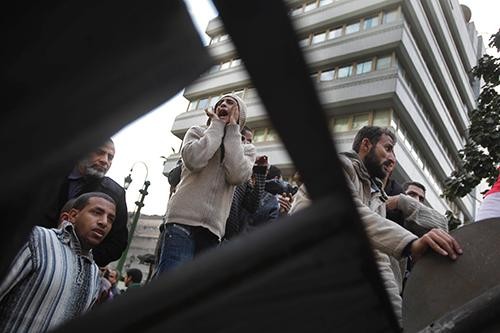CAIRO — Tensions rose in Egypt’s capital Wednesday as the army confronted protesters occupying new territory in front of the parliament building and the vice president warned of a possible coup, saying demonstrations must end or “”the dark bats of the night”” would emerge to terrorize the nation.
Vice President Omar Suleiman, who until has now presented himself as a soft-spoken voice of reason in discussions with opposition leaders, sounded rattled as he warned of tougher measures in comments to Egyptian newspaper editors published Wednesday.
The protests are “”very dangerous for society and we can’t put up with this at all,”” he said. “”We don’t want to deal with Egyptian society with police tools.””
He said he foresaw “”the dark bats of the night emerging to terrorize the people”” if the situation is not resolved. If demonstrations against President Hosni Mubarak’s leadership continued, he said, the likelihood is that “”a coup happens, which would mean uncalculated and hasty steps, including lots of irrationalities.””
A coup could come from within the regime, the army, the police or intelligence services — which he used to lead — or the opposition, Suleiman warned.
The Muslim Brotherhood, the largest opposition group, added to the tension by accusing the army, until now considered by protesters as a neutral broker compared to the hated police, of arresting and torturing protesters headed to Tahrir Square.
“”We appreciate the Egyptian army’s role in protecting protesters, said Muhammad Mursi, who has met with Suleiman to discuss the crisis. “”But in some places protesters are being taken to military camps and they are being tortured like those from the (police intelligence) tortured people in the past.””
He said 70 to 100 people had been tortured “”very badly”” by the army.
Some 500 protesters blocked the street in front of parliament Wednesday, some of them having camped there overnight after the massive gathering in Tahrir on
Tuesday four blocks away spilled over. While the government has promised not to forcibly remove demonstrators from the central plaza, the occupation of new territory increased pressure on the army to act.
The army blocked off Kasr el-Ainey Street, the major road into downtown from the south that runs by parliament, creating massive traffic jams even beyond those normal tie-ups.
“”It’s not OK what you are doing here,”” Gen. Hassan Ruwaini of the military police told protesters. “”If you want to protest go to Tahrir.”” But the army has pledged not to attack peaceful protesters — at least in Tahrir — and it is a rare time in modern Egyptian history when people feel free to disregard military orders.
“”We are not leaving, he is leaving,”” chanted 150 young men behind their barricade, not making it clear whether they were referring to Mubarak or the general. The frustrated officer pulled back from the confrontation, at least for a time.
Tahrir itself was surprisingly full of demonstrators Wednesday, which was not scheduled as a major day of protest, a sign of continuing vitality within the movement to remove Mubarak from power. In another escalation, the opposition called for protests in multiple locations in Cairo on Friday, the Muslim day of prayer.









